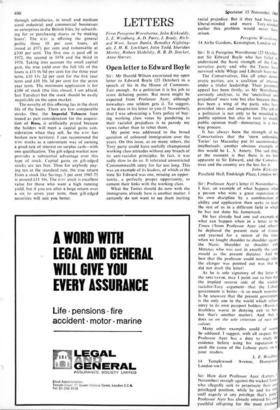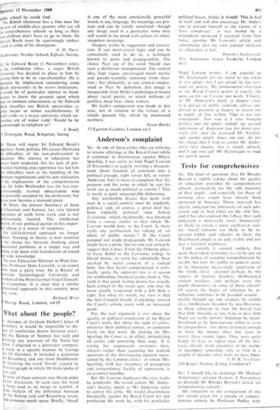LETTERS
From Peregrine Worsthorne, John Kirkcaldy, L. E. Weid berg. A. D. Parry, J. Brady, Rich- ard Wort, Susan Banks, Benedict Nighting- ale, J. H. K. Lockhart, John Todd, Sheridan Morley, Robert Skidelsky, R. B. D. Stocker, Anne Harvey.
Open letter to Edward Boyle
Sir: Mr Harold Wilson excoriated my open letter to Edward Boyle (25 October) in a speech of his in the House of Commons. Fair enough. As a politician it is his job to score debating points. But more might be expected from Professor Ayer, although nowadays one seldom gets it. To suggest, as he does in his letter to you (1 November), that I was advocating a Tory policy of buy- ing working class votes by pandering to their racialist prejudices is to parody my views rather than to rebut them.
My point was addressed to the broad question of coloured immigration over the years. On this issue, as on many others, the Tory party could have usefully championed working class attitudes without any breach of its anti-racialist principles. In fact, it was sadly slow to do so. It tolerated unrestricted Commonwealth entry for far too long. This was an example of its leaders, of which at the time Sir Edward was one, missing an oppor- tunity, a perfectly proper opportunity, to cement their links with the working class.
What the Tories should do now with the immigrants already here is another matter. I certainly do not want to see them inciting
racial prejudice. But if they had been less liberal-minded and more Tory-minded earlier this problem would never have arisen.
Peregrine Worsthorne 14 Airlie Gardens, Kensington, London w8
Sir: It is Peregrine Worsthorne (25 October) not Sir Edward Boyle who has failed to understand the basic strength of the Con- servative party and why the Tories have survived while Whigs and Liberals have not.
The Conservatives, like all other demo. cratic parties, are a coalition of interests under a titular leadership. Their perennial appeal has been firstly, as Mr Worsthorne correctly analyses, to the 'uncivilised and prejudiced' mass vote but also because there has been a wing of the party who have provided ideas and imagination. The job of a politician is not only to be moulded by public opinion but also in turn to mould public opinion itself—democracy is a two- way process.
It has always been the strength of the Conservatives that the 'stern unbending Tories (as Macaulay put it) accommodate intellectuals; another obvious example of this would be L. S. Amery. The sad thing at the moment is that there is no heir apparent to Sir Edward, and the Conserva- tives and the country are the less for it.
John Kirkralth
Passfield Hall, Endsleigh Place, London wcl
Sir : Professor Ayer's letter (1 November) is I fear, an example of what happens when a person who wins a great reputation in his own discipline by a combination of ability and application then seeks to teach the rest of us in a different field in which he has not done his homework.
He has already had one sad example of what can happen when in a letter to the Times ('from Professor Ayer and others' he deplored the present state of Greece and yearned for a return of the times when we fought shoulder to shoulder against the Nazis. Shoulder to shoulder with Metaxas who was cast in exactly the same mould as the present dictator. And the best that the professor could manage when the clanger was pointed out was that he did not draft the letter!
As he is sole signatory of the letter in the seecTAToa, may I point out to him that the implied reverse side of the wicked- racialist-Tory argument—that the Labou government is better—is so much nonsense. Is he unaware that the present government is the only one in the world which refuses entry to its own passport holders (Russia is doubtless worse in denying exit to hers. but that's another matter). And that 11 does so on the sole criterion of race and colour.
Many other examples could of course be adduced. I suggest, with all respect. that Professor Ayer has a duty to study the evidence before using his reputation la push the cause of the Labour party on to your readers.
L. E. WeidlY1 14 Templewood Avenue, Hampstead, London Nw3 Sir: How dare Professor Ayer (Letters. I November) inveigh against the wicked Tones who allegedly seek to perpetuate their owe privileged position, while he and his Wife sniff eagerly at any privilege that's going Professor Ayer has already entered his men youthful offspring for the most excluSil
public school he could find.
The British electorate has a fine nose for the cast of middle-class parents who are all for comprehensive schools so long as their (au children don't have to go to them. Sir Edward Boyle must be squirmingly embar- rassed at some of his champions.
A. D. Parry headmaster, Strodes School, Egham, Surrey.
Sir: Sir Edward Boyle (1 November) refers to the confidence whici, a major British University has decided to place in him by imiting him to be its vice-chancellor. He is therefore by implication considering some British universities to be minor institutions. It would be of particular interest to head- ters to know the grounds upon which an eminent educationist as Sir Edward Boyle classifies our British universities as ither major or minor establishments. If ds ranks as a major university which un- versifies are of minor rank? Would he be enough to enlighten us? I. Brady 5 Manorgate Road, Kingston, Surrey r: Many will regret Sir Edward Boyle's arture from politics. His career illustrates e difficulties of the non-professional in nation. His interest in education has ways been respected, but his lack of pro- essional training and experience has led him to difficulties such as his handling of the urnham negotiations and his late realisation f the implications of the comprehensive ue. Sir John Wolfenden was the last non- ofessionally trained educationist who as generally accepted by the profession, but e has now become a museum piece.
Mr Short, the present Secretary of State f Education and Science, has very limited xperience of sixth form work and is not ofessionally trained. The intellectual verty of our political parties in this impor- nt sphere is a source of weakness.
The old-fashioned approach no longer ffices. Training in theory is now essential the choice lies between thinking about ucational problems in a sloppy way and aling with them with foundations of sound d wide knowledge.
The new Education Minister in West Ger- any, Professor Hans Leussink, is an expert ther than a party man. He is Rector of arlsruhe Technological University and esident of the West German Vice-Chancell- 's Committee. It is clear that a similar ofessional approach in this country must me soon. - Richard Wort Murray Road, London, sw19







































 Previous page
Previous page